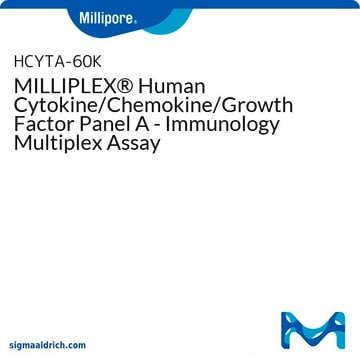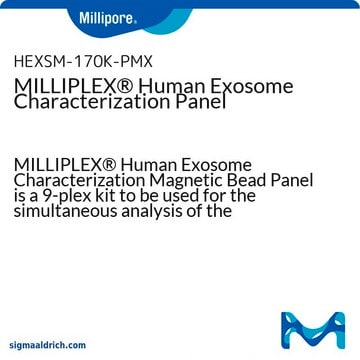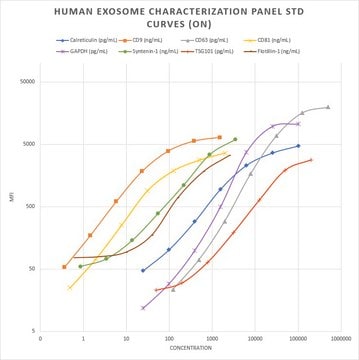HCVD3MAG-67K
MILLIPLEX® Human Cardiovascular Disease (Acute Phase) Magnetic Bead Panel 3 - Cardiovascular Disease Multiplex Assay
The analytes available for this multiplex kit are: Adipsin, AGP, α2-Macroglobulin, CRP, Fetuin A, Fibrinogen, L-Selectin, Serum Amyloid P, Haptoglobin, & Platelet Factor-4.
Synonym(s):
human CVD APP immunoassay panel, luminex human cardiovascular disease acute phase proteins multiplex assay, millipore human CVD acute phase proteins multiplex kit
About This Item
Recommended Products
Quality Level
species reactivity
human
manufacturer/tradename
Milliplex®
assay range
accuracy: 102%
(Haptoglobin)
accuracy: 109%
(AGP)
accuracy: 113%
(Platelet Factor-4)
accuracy: 117%
(Adipsin)
standard curve range: 0.004-15 ng/mL
(L-Selectin & SAP)
standard curve range: 0.012-50 ng/mL
(CRP)
standard curve range: 0.037-150 ng/mL
(PF4)
standard curve range: 0.061-250 ng/mL
(HPTGN)
standard curve range: 0.098-400 ng/mL
(AGP & Adipsin)
standard curve range: 0.244-1,000 ng/mL
(Fetuin A & vWF)
standard curve range: 0.488-2,000 ng/mL
(A2M)
technique(s)
multiplexing: suitable
detection method
fluorometric (Luminex xMAP)
shipped in
wet ice
General description
MILLIPLEX® Human Cardiovascular Disease (CVD) Panel 3 (Acute Phase) is a 10-plex kit to be used for the simultaneous quantification of any or all of the following analytes in human serum, plasma or tissue/cell lysate and culture supernatant samples: Adipsin, α-1-Acid-Glycoprotein (AGP), α-2-Macroglobulin (A2M), C Reactive Protein (CRP), Fetuin A, Fibrinogen, L-Selectin, Serum Amyloid P (SAP), Haptoglobin, and Platelet Factor-4 (PF4). (Please note: Fibrinogen is not detectable in serum.) This kit uses a 96-well format, contains a lyophilized standard cocktail, two internal assay quality controls and can measure up to 38 samples in duplicate.
The Luminex® xMAP® platform uses a magnetic bead immunoassay format for ideal speed and sensitivity to quantitate multiple analytes simultaneously, dramatically improving productivity while conserving valuable sample volume.
Panel Type: Cardiovascular
Application
- Analytes: α-1 Acid Glycoprotein (AGP), α-2-Macroglobulin (A2M), Adipsin (Factor D), C Reactive Protein (CRP), Fetuin A, Fibrinogen, Haptoglobin, sL-Selectin, Platelet Factor-4 (PF4/CXCL4), Serum Amyloid P (SAP)
- Recommended Sample Type: Human serum, plasma, cell/tissue culture supernatants and lysates
- Recommended Sample Dilution: 25 μL per well of 1:40,000 diluted serum or plasma; tissue/cell culture samples may require dilution in appropriate control medium
- NOTE: Fibrinogen is not detectable in serum
- Assay Run Time: Overnight (16-18 hours) at 2-8°C or 2 hours at room temperature (20-25 °C)
- Research Category: Cardiovascular Disease
- Research Subcategory: Metabolic Disorders
Features and Benefits
Other Notes
Legal Information
Signal Word
Danger
Hazard Statements
Precautionary Statements
Hazard Classifications
Acute Tox. 3 Dermal - Acute Tox. 4 Inhalation - Acute Tox. 4 Oral - Aquatic Chronic 2 - Eye Irrit. 2 - Skin Irrit. 2 - Skin Sens. 1 - STOT SE 3
Target Organs
Respiratory system
Storage Class Code
6.1C - Combustible acute toxic Cat.3 / toxic compounds or compounds which causing chronic effects
Certificates of Analysis (COA)
Search for Certificates of Analysis (COA) by entering the products Lot/Batch Number. Lot and Batch Numbers can be found on a product’s label following the words ‘Lot’ or ‘Batch’.
Already Own This Product?
Find documentation for the products that you have recently purchased in the Document Library.
Our team of scientists has experience in all areas of research including Life Science, Material Science, Chemical Synthesis, Chromatography, Analytical and many others.
Contact Technical Service









